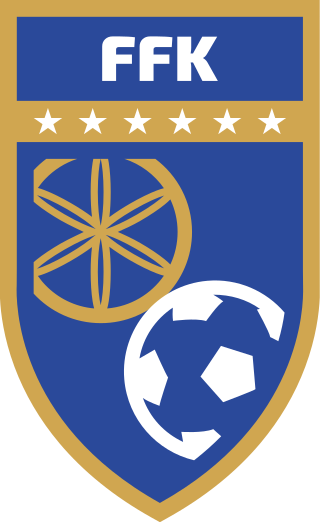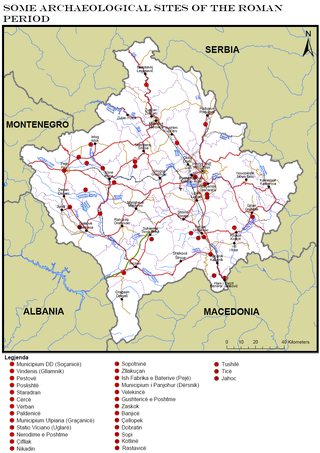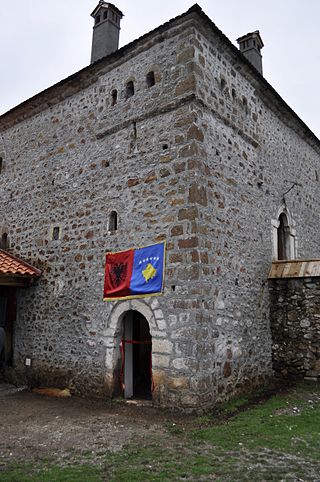This is a list of historical and living Albanians who are famous or notable, sorted by occupation and alphabetically.

The Alliance for the Future of Kosovo is a right-wing political party in Kosovo.

The Kosovo national football team represents Kosovo in men's international football. The team is controlled by the Football Federation of Kosovo, the governing body for football in Kosovo, and is under the jurisdiction of FIFA globally.
The Cape Town City Ballet Company, formerly known as the CAPAB Ballet Company, is a dance company based in Cape Town, South Africa.

Pristina or Prishtina is the capital and largest city of Kosovo. It is the administrative center of the eponymous municipality and district.

Football Club Ballkani, commonly known as Ballkani, is a professional football club based in Suhareka, Kosovo. The club plays in the Football Superleague of Kosovo, which is the top tier of football in the country.
Edward Clug is a choreographer in the field of contemporary ballet born in Romania
Classical music in Kosovo refers to the art music cultivated in Kosovo. The roots of classical music in Kosovo are found in the 1940s and include the time period from the times when Kosovo was part of Yugoslavia to this day. It can be said that there is a tradition of classical music in Kosovo, however, compared to other Balkan countries and especially European countries this tradition is younger. Classical music in Kosovo reaches back about 70 years. Even though in a short period of time, this music has evolved, passing through generations of composers and artists. In his book Albanian: Zhvillimi i stileve në veprat e kompozitorëve shqiptarë të Kosovës, Engjëll Berisha comments:
"The diversity of styles in Albanian music [of Kosovo], its national patterns with sound idea-aesthetic foundations are a characteristic of the European musical reality, so many many works are of interest abroad, too, because during this relatively short period Albanian classical music in Kosovo has compensated for the delay in its development."
Theatre in Kosovo like the culture of Kosovo is a dual tradition.

The Roman heritage sites in Kosovo represent a multitude of monuments of material and spiritual culture, which reflect the Roman period in this region. Among them, a special place is occupied by those that represent the development of art, such as the plastic monuments that are more frequent, and at the same time occupy an important place, because with the presentation of figures in relief and with numerous inscriptions they speak to us enough for this period.
Ilir Kerni is an Albanian male dancer. He gained acclaim in a ballet troupe in the 1980s. Kerni is one of the most renowned Albanian ballet dancers worldwide. He became the director of the National Theatre of Opera and Ballet of Albania in 2013. Kerni held the position of director of Albania's only national theater of opera and ballet for almost three years until 2016. In October 2019, Kerni was appointed director of ballet at the Split National Theater of Opera and Ballet in Croatia, a position which he will hold for the next four years, until 2023.

The National Theatre of Kosovo was founded in 1946 in the city of Prizren, Kosovo. It is the highest ranked theatre institution in the country, with the largest number of productions. The National Theatre is the only public theatre in Kosovo and therefore it is financed by Ministry of Culture, Youth and Sport. This theatre has produced more than 400 premieres which have been watched by more than 3 million spectators.

As the capital city of Kosovo, Pristina is the heart of the cultural and artistic development of all Albanians that live in Kosovo. The department of cultural affairs is just one of the segments that arranges the cultural events, which make Pristina one of the cities with the most emphasized cultural and artistic traditions.
Music composition and composers in Pristina refers to music composition and composers who have left their mark in Pristina. The importance of Kosovan Folklore on the different genres, their development and their popularity. As referring to genres as a categorization would not cover all compositions and composers in a fair way, a highlight of every composers work and different genres is provided because of the different genres a composers work has included throughout the years.
Ilir is an Albanian masculine given name, derived from i lirë, which means "illyrian" and "being free" in the Albanian language. It is also the Albanian way of referring to an "Illyrian" male.
Abdurrahman Nokshiqi, known as Abi Nokshiqi was an Albanian ballet dancer and choreographer. He was the first director of the Kosovo Ballet at the National Theater of Kosovo.
The international friendly between the Albania and Kosovo national football teams on 14 February 1993 was the first match played by Kosovo after the partition of Football Federation of Kosovo from Football Association of Yugoslavia. It took place at the Selman Stërmasi Stadium in Tirana, Albania with 14,000 fans in attendance.
The Kosovo national under-15 football team is the national under-15 football team of Kosovo and is controlled by the Football Federation of Kosovo.

The Bujan Conference was a political assembly held between December 31st, 1943 and January 2nd, 1944 in Bujan, a village in the Highlands of Gjakova. It was attended by 49 delegates from the Communist Party of Albania and the Communist Party of Yugoslavia. The organization of the conference was fueled by the main political goal among Kosovo Albanians in that era which was self-determination and reunification of Kosovo with Albania. The main resolution voted in Bujan called for the unification of the Socialist Republic of Albania and Kosovo after the end of WWII. The resolution of Bujan was abandoned after German retreat from the Balkans. Kosovo remained part of Yugoslavia, as an autonomous region of SR Serbia. The first uprising against the new Yugoslav regime began in late 1944, a few weeks after Yugoslav leadership made it clear that the unification of Kosovo with Albania would not occur after the war.
The Kosovo Rugby Federation (KRF),, is the governing body for rugby union in Kosovo. The KRF is a member of Rugby Europe.








